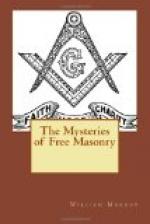The obligation being administered, the candidate rises,[4] and the Master proceeds to give the sign, word, and grip of this degree, as follows: The sign (sometimes called the due-guard) is given by laying the edge of the thumb of the right hand in a vertical position on the centre of the mouth, high enough to touch the upper lip. The word is given by taking each other by the Master’s grip, and pulling the insides of their feet together, when the Master whispers the word, “GIBLEM,"[5] in the ear of the candidate. Then they clap their left hand on each other’s right arm, between the wrist and elbow, disengaging (at the same moment) their right hand from the Master’s grip; they each seize the left arm of the other with their right hands, between the wrist and elbow, and (almost at the same instant) yielding their left hand hold on each other’s right arm, and moving their left hands with a brisk motion, they clasp each other’s right arm with their left hands, above the elbow, pressing their finger nails hard against the arms, as they shift their hands from place to place; and the Master says (in union with these movements), “From grips to spans, and from spans to grips: a twofold cord is strong, but a threefold cord is not easily broken.” The Master then conducts the candidate to the chair, and, as he ascends the steps, the Master says, “Brother, I now have the pleasure of conducting you into the oriental chair of King Solomon;” places a large cocked hat on his head, and comes down to the front of the newly-installed Master, and addresses him as follows: “Worshipful brother, I now present you with the furniture and various implements of our profession; they are emblematical of our conduct in life, and will now be enumerated and explained as presented. The holy writings, that great light in Masonry, will guide you to all truth; it will direct your path to the temple of happiness, and point out to you the whole duty of man. The square teaches to regulate our actions by rule and line, and to harmonize our conduct by the principles of morality and virtue. The compass teaches to limit our desires in every station; thus rising to eminence by merit, we may live respected, and die regretted. The rule directs that we should punctually observe our duty; press forward in the path of virtue, and neither inclining to the right or to the left, in all our actions have eternity in view. The line teaches the criterion of moral rectitude; to avoid dissimulation in conversation and action, and to direct our steps to the path that leads to immortality. The book of constitutions you are to search at all times; cause it to be read in your Lodge, that none may pretend




